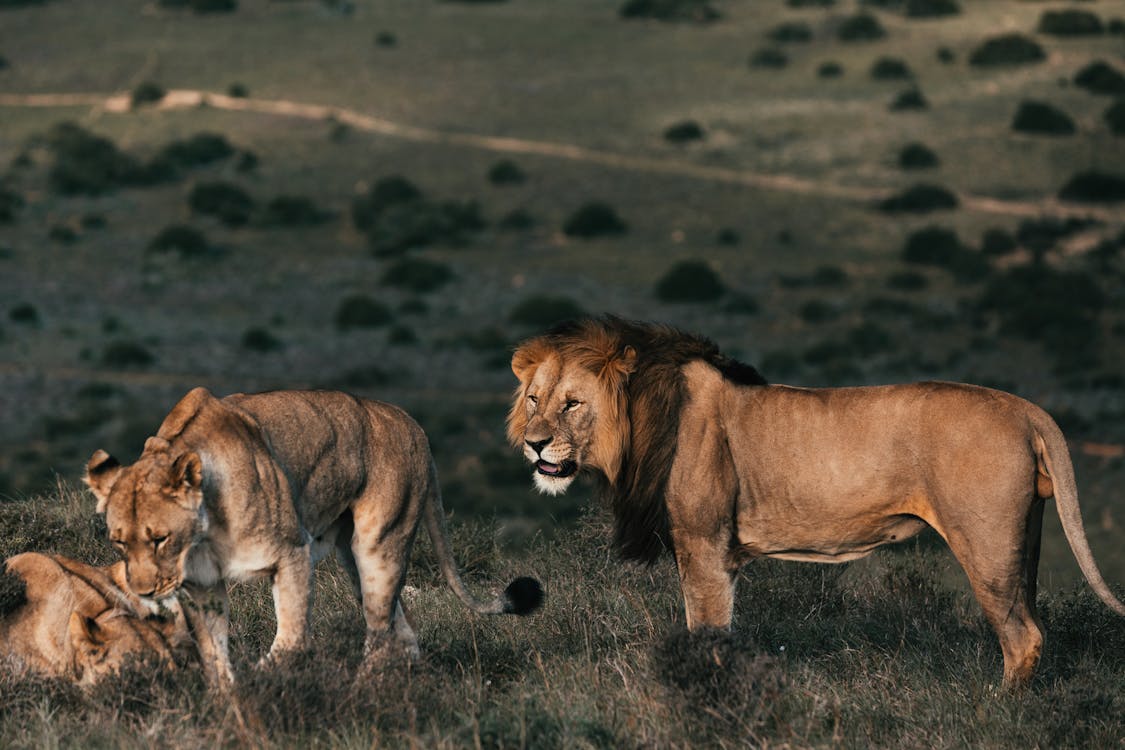The thrill of hunting a lion in Africa is like no other in the hunting world. Stalking the African savannah for one of the Big Five, with its primal allure and heart-pounding danger, defines the essence of a true African Lion safari. For the seasoned hunter, chasing this magnificent apex predator offers unmatched adventure and a real test of skill and bravery. However, as exciting as it is, hunting a lion in Africa requires a sharp mind, well-honed techniques, and a great deal of respect for the beast you are pursuing. After all, in the wild, it is not just about hunting a lion in Africa, it is also about ensuring you do not become the hunted!
In this guide, I will walk you through some of the best strategies, tips, and tricks for a successful lion hunt, while also addressing the important question of safety—how to avoid being caught off guard by a charging lion. Whether you are a first-timer or an experienced big game hunter, these insights will help you prepare for an African Lion safari that is as safe as it is exhilarating.
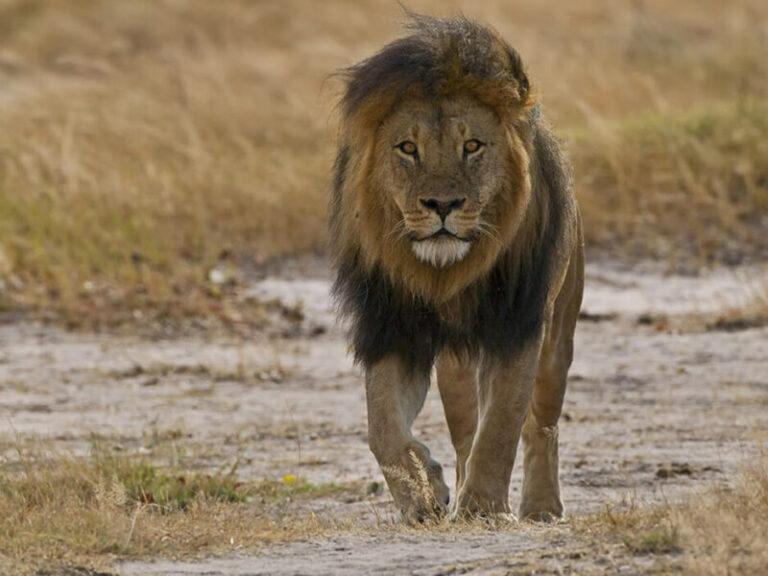
[DYNAMIC-BLOGTABLEOFCONTENT]
Key Takeaways
- Hunting a lion in Africa is dangerous, whether you are a novice or an experienced dangerous game hunting enthusiast; be prepared!
- Before arranging a lion hunt, it is crucial to study their habits, movement patterns, and preferred environment. These nocturnal predators are territorial, social animals, whose keen senses challenge for hunters when hunting a lion in Africa.
- When hunting a lion in Africa, remember to adequately prepare your gear: From rifles and optics to safety gear and clothing, all complete an important task.
- Never underestimate the value of backup gear, such as spare rifles, optics, and ammo. Having backup gear ensures you can continue the hunt safely and successfully.
- Correct shot placement on a lion hunt will result in a quick and humane kill on the dangerous game hunting safari.
- Ethical lion hunting allows for the conservation of these majestic animals and for maintaining the balance of the ecosystem. A responsible hunt should always adhere to local laws, quotas, and regulations.
Understanding the Nature of the Hunt: The King of the Beasts
- The African lion is commonly known as the “King of the Beasts,” a title that reflects its power and dominance in the wild. Lions are fearsome predators and with their shthiarp claws, powerful jaws, and natural hunting skills, they pose a challenge even for experienced hunters. Before hunting a lion in Africa, it is essential to fully understand the nature of these majestic animals.
- Lions exhibit both social and solitary hunting behaviors. Males typically defend their territories, while groups of females, or prides, work together to take down prey. Ethical hunting quotas often focus on mature males, making them the primary targets during a hunt. However, lions are incredibly intelligent, and their ability to blend into their surroundings should not be underestimated. In fact, they can easily track a hunter, often detecting your presence long before you notice them.
Before organizing a lion hunt, it is crucial to study their habits, movement patterns, and preferred environment. Lions are most active during the cooler times of the day, typically hunting in the early morning or late evening while resting through the heat of midday. Tracking them at these times improves your odds of success, though it demands patience and a keen understanding of their surroundings.
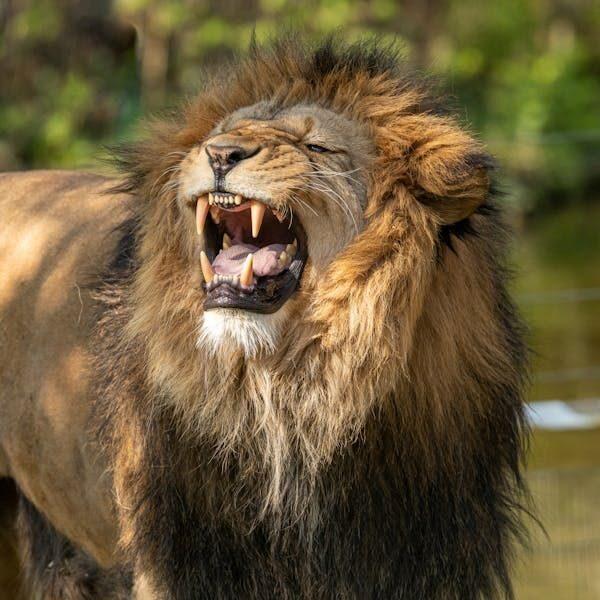
Essential Gear for Lion Hunting
Preparing for hunting a lion in Africa requires more than just the basics; you are facing a dangerous predator, and thorough preparation is essential to both your safety and success. Here is what you will need:
- Rifle: The right rifle is arguably the most critical part of your gear. Many experts suggest using a caliber no smaller than .375 H&H Magnum, but larger options like the .416 Rigby or .458 Lott are often preferred for their ability to ensure deep penetration and stopping power. Your rifle must deliver enough energy to take down the lion humanely and swiftly, making shot placement a crucial factor.
- Ammunition: High-quality, controlled-expansion bullets are necessary. You will want ammunition that balances accuracy and power. Since hunting a lion in Africa usually requires follow-up shots, packing extra rounds is always a clever idea.
- Optics: A reliable scope is essential for any lion hunt. Although many shots are taken at close range, having clear optics helps you spot your target and ensure accurate shot placement. Scopes designed for low-light conditions are particularly useful, as lions are often most active at dawn and dusk.
- Clothing: Wearing neutral, earth-tone colors helps you blend into the natural surroundings. Lions have excellent eyesight and can easily detect bright colors or unnatural movements. Lightweight, breathable clothing is also necessary to stay comfortable in Africa’s hot climate.
- Safety Gear: Given the high-risk nature of hunting a lion in Africa, it is important to have safety equipment like a high-quality first aid kit, GPS, and communication devices. Bringing extra water and food for extended hunts is also a smart precaution.
Proper preparation, attention to detail, and respect for the animal you are pursuing are key elements of a successful lion hunt.
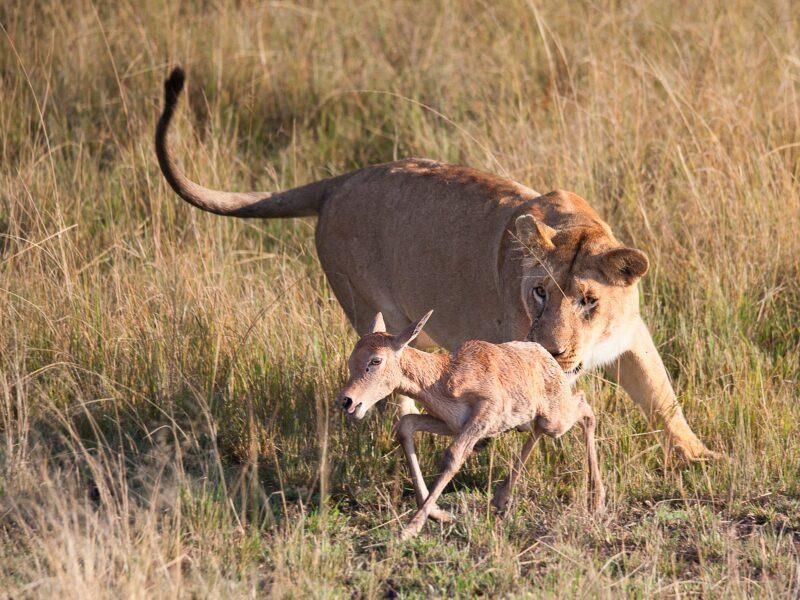
Back up Gear
When starting a lion hunting safari, having the right backup gear is just as important as your primary hunting equipment. Backup gear is essential for both safety and success, as hunting a lion in Africa involves high-risk scenarios that can change quickly. The following is a list of recommended backup gear for a lion hunt:
Backup Rifle
- Purpose: If your primary rifle fails (misfires, jams, etc.), or if a charging lion demands a quick follow-up shot, having a backup rifle can be a lifesaver.
- Caliber: The backup rifle should be just as powerful as your primary weapon. Consider carrying something in the .375 H&H Magnum or larger range. Many experienced hunters bring a double-barrel rifle for quicker follow-up shots.
- Features: Ensure the rifle is easy to handle, fast to reload, and reliable under pressure. A bolt-action rifle with a smooth action or a double-barrel rifle is ideal for dangerous game.
Additional Ammunition
- Purpose: Running out of ammunition in the middle of a hunt is dangerous, especially when tracking a wounded lion.
- Type: Carry extra high-quality controlled-expansion bullets for your main rifle, and ensure you have enough rounds for your backup rifle as well. Pack more than you think you will need to prepare for any scenario.
Secondary Optics
- Purpose: If your primary scope gets damaged or loses clarity, having a backup scope can ensure you do not lose out on your shot.
- Type: A low-power, rugged scope that handles low-light conditions is ideal. Alternatively, having a pair of high-quality binoculars for scouting and spotting is also useful.
Multi-tool or Knife
- Purpose: A multi-tool or a sturdy hunting knife serves a variety of purposes, from cutting through brush to field dressing the lion after a successful hunt. It can also be critical in survival situations.
- Features: Choose a durable, sharp blade with a secure grip. A multitool should include pliers, a saw, and screwdrivers to handle any potential field repairs.
Portable First Aid Kit
- Purpose: Injuries during a lion hunt, whether from accidents, environmental hazards, or wildlife encounters, can occur. A well-stocked first aid kit could be a critical lifeline.
- Contents: Ensure the kit includes trauma supplies (tourniquets, pressure bandages, wound dressings), antiseptics, pain relief medications, tweezers, and snakebite kits. Some hunters also bring a small sewing kit for field repairs to gear or clothing.
Spare Clothing and Footwear
- Purpose: Hunting a lion in Africa often involves long hours in unpredictable terrain, and backup clothing ensures comfort and preparedness for changing weather.
- Clothing: Carry extra moisture-wicking shirts, a windproof jacket, and a hat for sun protection. A spare pair of socks is essential to prevent blisters and discomfort.
- Footwear: A backup pair of hunting boots, especially if your primary boots get wet or damaged, ensure that you can continue the hunt without hindrance.
Emergency Communication Devices
- Purpose: Since a lion hunting safari usually takes place in remote areas, staying connected is crucial in emergencies.
- Type: A satellite phone or GPS communication device like a Garmin In Reach can be a lifeline. These devices allow you to send SOS messages, track your location, and communicate with your team in areas without cell service.
Backup GPS or Compass
- Purpose: In case your primary GPS fails, having a backup navigation device is essential for tracking, finding your location, and safely navigating back to base camp.
- Type: A small, durable handheld GPS or a reliable compass should be part of your gear. Make sure you are proficient in using a compass and map as a fail-safe navigation method.
Spare Batteries and Power Bank
- Purpose: Modern hunting gear like GPS, scopes, radios, and cameras often rely on batteries, so it is crucial to have backups.
- Type: Pack extra batteries for any electronic equipment, including your optics, flashlights, and GPS devices. A solar-powered power bank or one with a large capacity is also helpful for charging your devices in the field.
Flashlight and Headlamp (with Extra Batteries)
- Purpose: Lions are most active at dawn and dusk, making visibility challenging during those times. A reliable flashlight and headlamp ensure you can see in low-light conditions.
- Type: Choose rugged, waterproof models with a high-lumen output. LED flashlights with long battery life are recommended, and a headlamp allows you to keep your hands free for tasks.
Field Repair Kit
- Purpose: The rough African terrain can damage your gear. A field repair kit ensures that you can fix broken equipment on the go.
- Contents: Include items like duct tape, zip ties, super glue, a needle and thread, and a small tool for rifle repairs.
Water Filtration System
- Purpose: In the wild, water sources may not always be clean or safe. A portable filtration system ensures you have access to safe drinking water.
- Type: Carry a portable water filter, purification tablets, or a LifeStraw in your pack. This ensures you are not dependent on pre-packed water, especially if your hunt runs long.
Emergency Shelter or Space Blanket
- Purpose: In case you are stranded in the wild overnight or in severe weather, having an emergency shelter can keep you safe from the elements.
- Type: A compact, lightweight emergency bivy or space blanket will protect from cold or rain without taking up too much room in your pack.
Backup Camera
- Purpose: Many hunters enjoy documenting their adventures. If your primary camera fails or its batteries run out, a backup ensures you can still capture the experience.
- Type: A small, durable action camera or smartphone with a good camera can serve as a backup.
The Importance of Backup Gear
- Hunting a lion in Africa is not just about having the best primary gear—it is about preparation for the
unexpected. The harsh conditions, unpredictable terrain, and danger from the lion itself mean that gear can break or malfunction at any time.
- Having backup gear ensures you can continue the hunt safely and successfully.
- The wilderness can be unforgiving, but with the right planning and equipment, a lion hunting safari can be one of the most exhilarating experiences of your life!

Shot Placement: The Key to a Clean Kill
A successful African Lion safari hinges on proper shot placement.
Lions are robust animals with thick muscle and bone, meaning your shot needs to be both precise and powerful. A poor shot could lead to a wounded lion, which can turn an exciting hunt into a dangerous encounter in an instant.
For a clean kill, aim for the following:
- Shoulder shot: The most effective shot for a lion is the shoulder shot. This placement hits the vital organs—heart and lungs—and causes maximum internal damage, ensuring that the lion is taken down quickly and humanely. Aim slightly behind the shoulder to target the lungs or the heart, depending on your angle.
- Frontal chest shot: If the lion is facing you directly, a frontal chest shot can also be effective, but it is far more dangerous. You need to hit the lion right in the center of the chest, aiming for the heart. This is tricky because a lion can charge fast, and any hesitation could result in a missed shot—or worse, the lion charging toward you.
- Brain shot: The brain shot is often reserved for dangerous game, including lions when they are charging. This shot requires extreme precision and confidence, as the brain is a small and well-protected target. It is a risky shot but can be a lifesaver in a crisis.
Mastering shot placement is key to minimizing suffering and ensuring your safety. It is always better to practice extensively before your African Lion safari to ensure that when the time comes, you are ready for the pressure and adrenaline of the hunt.
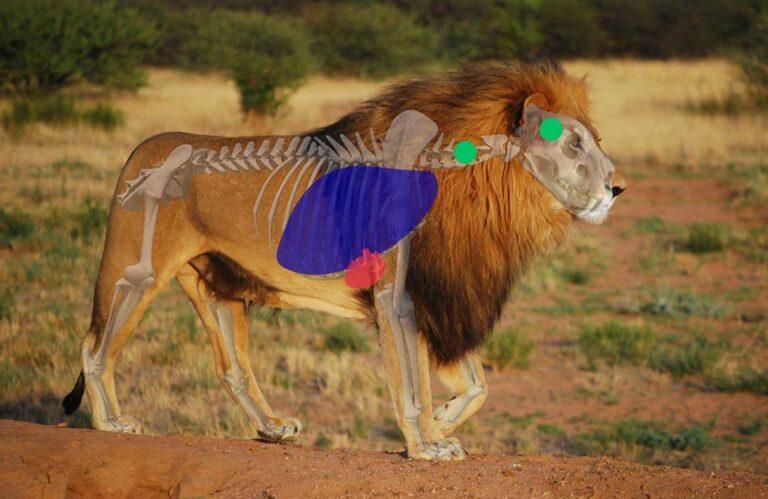
Tracking Techniques for Lions
- Tracking a lion is an art form in itself. While you will often have the help of professional guides when hunting a lion in Africa, it is useful to understand the basics of tracking so you can contribute to the process.
- Lions leave behind distinct paw prints, which are usually much larger than those of other big cats. Their prints have a rounded shape with four toe pads and no visible claws (since lions retract their claws when walking). Fresh tracks are crisp and clear, indicating that the lion is nearby.
- One key tip for tracking lions is to listen. Lions are vocal creatures, especially during the early morning and late evening. Roars can travel up to 5 miles, helping you locate a pride or solitary male. Additionally, they often leave behind evidence of their presence such as carcasses or tufts of fur, which can indicate their feeding grounds or resting areas.
- Patience is critical during the tracking phase, as they are notoriously stealthy, so moving slowly and scanning the area is essential. Your hunting team will likely use spotters or scouts who move ahead to identify signs of recent lion activity. Once a fresh track is found, the adrenaline starts pumping as you move into position.
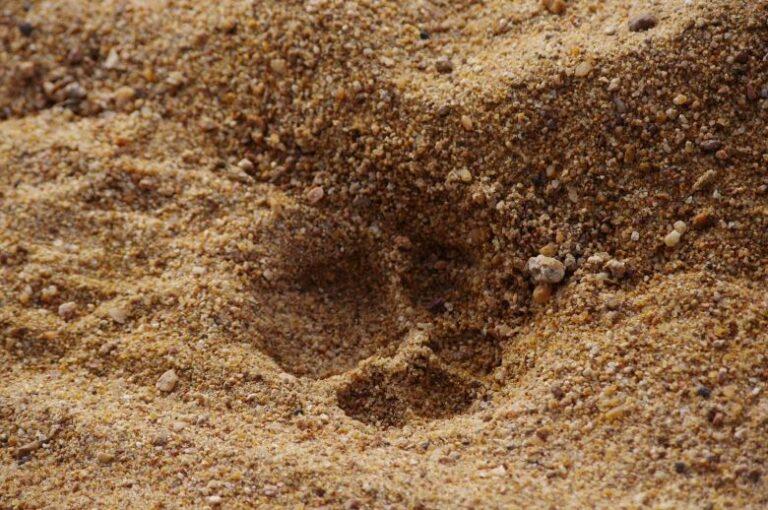
Staying Safe: How to Avoid Becoming the Prey
While Lion hunting is thrilling, it is also incredibly dangerous. An essential part of the hunt is ensuring you do not become the hunted. Lions can attack swiftly and silently, and a charging lion can close the gap between you and it in just a few seconds. So, how do you stay safe?
- Never hunt alone: Always hunt with a team, including experienced guides and professional hunters who are familiar with Lion behavior and tracking. They will also carry backup rifles in case things go wrong.
- Stay alert: Lions can stalk you just as you stalk them. Never let your guard down, even when you think the lion is unaware of your presence. Lions often move in silently, and if you hear or see one unexpectedly close by, you need to react immediately.
- Watch for warning signs: Lions exhibit warning behaviors when they feel threatened. They may crouch low to the ground, flatten their ears, or swish their tail. If you see these signs, the lion is preparing to charge. You will need to act fast, getting into a shooting position without panicking.
- Know when to shoot: Sometimes, the best defense is a well-placed shot. If a lion charges, aim for the brain to stop it in its tracks. This is one of the most dangerous scenarios when hunting a lion in Africa and being calm under pressure is crucial.
- Keep your distance: Do not approach a wounded lion, as they are most dangerous when cornered or injured. Always follow your guide’s instructions on how to track and approach the lion after a shot.
Being well-prepared, staying vigilant, and acting quickly are your best defenses against a dangerous encounter. Lion hunting is not just about the skill of shooting but also about reading the situation and knowing when to back off or take decisive action.
The Ethics of Lion Hunting
Ethical lion hunting is crucial for the conservation of these majestic animals and for maintaining the balance of the ecosystem. A responsible African Lion safari should always adhere to local laws, quotas, and regulations. Professional hunters and guides ensure that the hunts target older males, often past their prime, which has less impact on the lion population.
Many reputable hunting operations also contribute a portion of their profits to conservation efforts, funding anti-poaching units and habitat preservation projects. Sustainable lion hunting helps maintain the health of both the lion population and the broader ecosystem.
Furthermore, ethical hunters ensure that every part of the animal is used, with meat often donated to local communities. Trophy hunting also plays a role in creating revenue streams for wildlife reserves, which depend on such funding to continue protecting their land and animals.
Frequently Asked Questions
Is lion hunting legal in South Africa?
Yes, lion hunting is legal in South Africa. Both male and female lions are available to hunt in South Africa. Canned or captive lions, as well as free-range lion hunting, is available.
What gun can take down a lion?
When it comes to dangerous game hunting in Africa, a minimum of a .375 is required. However, when hunting a lion in Africa, many other popular choices are available, including a .416 Rigby or .458 Lott.
Why do humans hunt lions?
Lions are hunted for numerous reasons, from being a trophy for a keen trophy hunter, to meat and poaching of their body parts, such as claws, skin, bones, and teeth for “muti” (traditional medicine) in the African and Asian markets.
Which African country has the most lions?
Tanzania is renowned for its exceptional lion populations.
Which African country is known to have the biggest lions?
While many African countries offer hunters a choice of exceptional lion trophies, Botswana is well-known for its large lion trophies.
Conclusion
Hunting a lion in Africa is not for the faint-hearted, but rather for those responsible hunters looking for a new challenge, while wholeheartedly adhering to the local destination’s laws and regulations.
Author: R. du Toit
